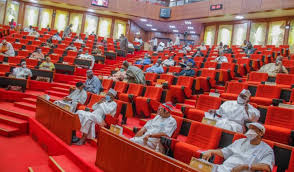After the Federal Government was granted a $155 million loan from the World Bank for the National Mass Metering Programme (NMMP) on Thursday, the Senate moved to shield domestic meter producers.
Following up on a motion introduced by Senator Victor Umeh (LP, Anambra Central) during plenary, this resolution was passed.
When presenting the motion, Umeh said that authorities in the industry procurement sector of every developing country have a responsibility to safeguard domestic manufacturers “and would only try to augment importation of goods and services where there is a clear-cut gap between local production and consumption.”
He stated, “Members of the Association of Metre Manufacturers of Nigeria, AMMON, are capable of producing world-standard smart meters; therefore, the Transmission Company of Nigeria, TCN, and the Nigerian Electricity Regulatory Commission, NERC, under Phase 1 of the Mass Metering Programme of the federal government, issued the association, following a competitive bidding process, a ‘Letter of No Objection’ to award four million metres in 2022.”
Also in 2020, “the Central Bank of Nigeria committed to funding the National Mass Metering Programme, NMMP, Phase 1,” but “after eight months of awards to local manufacturers, withdrew funding, which affected the programme’s workability.”
While Umeh has announced that the World Bank has approved a $155 million loan for the National Mass Metering Programme, he is concerned that “the ongoing World Bank-funded NMMP Phase 2 seeks to promote foreign companies’ participation against competent and pre-qualified local metre manufacturers,” leading to a loss of jobs and revenue.
The congressman went on to say that TCN had extended the bidding advertisement for the delivery and installation of 1.2 million smart meters to the 11 distribution firms in the country until July 25, 2023, on behalf of the World Bank.
According to him, only foreign companies met the bidding requirements, thereby shutting out the 35 domestic meter producers.
His organization, AMMON, has spent billions of naira in the industry, and his members directly employ 10,000 people and indirectly employ over 30,000. If this trend were to continue, he said, it would be devastating for AMMON members.
The Senate called on the federal government to halt the TCN Tender for the second phase of the NMMP, which is supported by the World Bank, immediately in a series of resolutions. In accordance with local content and backward integration strategies that catalyze focal capacity building, employment generation, and economic growth for Nigeria, a thorough examination of the procurement criteria is planned.
In light of the current economic crisis brought on by high unemployment and a falling currency, the Senate has also urged TCN and other interested parties to approach the African Export-Import Bank (AFREXIM) and the African Development Bank (AFDB) about securing alternative loans in the event that the World Bank’s terms do not support local economic growth.
The Senate has also requested that AMMON members be assessed from CBN intervention monies in order to further develop the sector and enhance the national economy.
